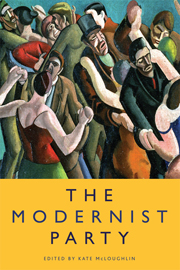Book contents
- Frontmatter
- Contents
- A Note of Thanks
- The Guest List
- Introduction: A Welcome from the Host
- 1 ‘The dinner was indeed quiet’: Domestic Parties in the Work of Joseph Conrad
- 2 Prufrock, Party-Goer: Tongue-Tied at Tea
- 3 Party Joyce: From the ‘Dead’ to When We ‘Wake’
- 4 ‘Looking at the party with you’: Pivotal Moments in Katherine Mansfield's Party Stories
- 5 Virginia Woolf's Idea of a Party
- 6 Proustian Peristalsis: Parties Before, During and After
- 7 ‘Ezra through the open door’: The Parties of Natalie Barney, Adrienne Monnier and Sylvia Beach as Lesbian Modernist Cultural Production
- 8 ‘Indeed everybody did come’: Parties, Publicity and Intimacy in Gertrude Stein's Plays
- 9 The Interracial Party of Modernist Primitivism and the Black ‘After-Party’
- 10 The Party In Extremis in D. H. Lawrence's Women in Love
- 11 Bohemian Retrospects: Ford Madox Ford, Post-War Memory and the Cabaret Theatre Club
- 12 ‘Pleasure too often repeated’: Aldous Huxley's Modernity
- Index
2 - Prufrock, Party-Goer: Tongue-Tied at Tea
Published online by Cambridge University Press: 05 April 2014
- Frontmatter
- Contents
- A Note of Thanks
- The Guest List
- Introduction: A Welcome from the Host
- 1 ‘The dinner was indeed quiet’: Domestic Parties in the Work of Joseph Conrad
- 2 Prufrock, Party-Goer: Tongue-Tied at Tea
- 3 Party Joyce: From the ‘Dead’ to When We ‘Wake’
- 4 ‘Looking at the party with you’: Pivotal Moments in Katherine Mansfield's Party Stories
- 5 Virginia Woolf's Idea of a Party
- 6 Proustian Peristalsis: Parties Before, During and After
- 7 ‘Ezra through the open door’: The Parties of Natalie Barney, Adrienne Monnier and Sylvia Beach as Lesbian Modernist Cultural Production
- 8 ‘Indeed everybody did come’: Parties, Publicity and Intimacy in Gertrude Stein's Plays
- 9 The Interracial Party of Modernist Primitivism and the Black ‘After-Party’
- 10 The Party In Extremis in D. H. Lawrence's Women in Love
- 11 Bohemian Retrospects: Ford Madox Ford, Post-War Memory and the Cabaret Theatre Club
- 12 ‘Pleasure too often repeated’: Aldous Huxley's Modernity
- Index
Summary
J. Alfred Prufrock would not rank highly on anyone's list of partyguests. Distinctly lacking in conviviality, the protagonist of T. S. Eliot's poem anticipates ‘the taking of a toast and tea’ as an excruciating occasion on which the ‘overwhelming question’ he wishes to pose will be, even if he can bring himself to pose it, painfully misunderstood. The work's critics have attributed the problem to Prufrock (or Eliot) himself, analysing his internal wrestling in terms of fear of female (and male) sexuality, hysteria and other psychological disorders, Matthew Arnold's ‘buried life’, Sigmund Freud's notion of the uncanny and Henri Bergson's ideas of anticipatory retrospection, inhibitory self-awareness and dédoublement. Without gainsaying the interpretative richness of these approaches, this chapter suggests another: a redirection of critical focus from the construction of Prufrock to the anxiogenic situation. Why does Eliot choose – of all things – a tea-party as the occasion of his protagonist's logophobia? Why should an apparently benign prospect, the consumption of ‘tea and cakes and ices’ (l. 79), provoke such consternation? In pursuing these questions, which centre around the opportunities and limitations of the social sphere, Jürgen Habermas's theories of communicative action are illuminating, particularly given their affinities with the thinking of Josiah Royce and F. H. Bradley, philosophers with whose work Eliot was intimately familiar. But Eliot's poem also tests Habermas's theories by introducing complicating factors of soma and psyche to communicative situations.
- Type
- Chapter
- Information
- The Modernist Party , pp. 45 - 63Publisher: Edinburgh University PressPrint publication year: 2013



